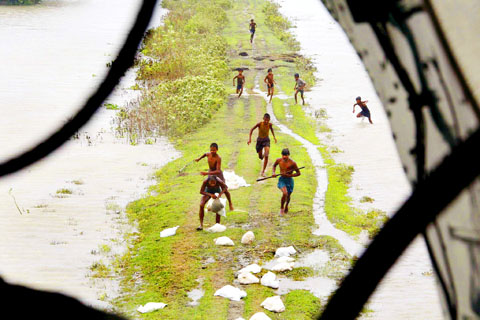The Indian army and navy stepped up efforts yesterday to rescue hundreds of thousands of people marooned by floods, while rising river levels also rang alarm bells in Bangladesh.
In India’s impoverished eastern state of Bihar, villagers have been living on rooftops for days, while others are eating plants and leaves after exhausting food stocks.
Aid agencies said the Bihar government should have done more to anticipate the disaster and plan relief operations in a region hit by monsoon flooding every year.

PHOTO: EPA
“Lessons from the past disasters should be kept in mind while planning response,” ActionAid said in a statement. “A long-term comprehensive response is necessary to deal with relief, recovery and disaster preparedness.”
Three million people have been displaced from their homes and at least 90 killed by floods in Bihar, officials say, after the Kosi river burst a dam in Nepal, swamping hundreds of villages in Bihar and destroying 100,000 hectares of farmland.
In Bihar, hundreds of boats are being used to evacuate people but more are needed, while heavy rains over the past few days have hampered rescue and relief operations, officials said.
“Such is the extent of devastation that the forces deployed are proving too small,” Pratyay Amrit, a senior state disaster management official, said yesterday.
The army, which had already deployed five columns of around 120 men, sent in another 14, officials said yesterday, while three naval companies were also asked to help.
The situation on the ground was getting desperate.
“We don’t have any more food grain stocks left and me and my family are all chewing plants and leaves to stay alive,” Mohan Sharma said by telephone from Supaul district.
TV pictures showed people fighting to get places in boats, as soldiers in life jackets tried to restore order.
More than 467,000 people have been evacuated so far, but there are thousands still marooned. Activists and local media say the death toll could be many times higher than official estimates.
Some specialists have blamed the floods on heavier monsoon rains caused by global warming, while others say authorities have failed to take preventive measures and improve infrastructure.
The UN warned that “the heat, combined with limited supplies of safe drinking water and poor hygiene conditions, poses a great risk of water and vector-borne diseases.”
In one camp set up at a school in Saharsa district — one of the worst hit of the five flooded districts in Bihar — a nurse was trying to treat the sick armed with just one packet of paracetamol tablets.
In India’s northeastern state of Assam, rising rivers broke mud embankments and swamped more than 100 villages, forcing 50,000 people from their homes.
Two people drowned overnight, raising the death toll in the northeast region to 34.
In Bangladesh, about half a million people were marooned after several rivers in the north and central districts broke their banks and swamped villages and farmlands.

In the sweltering streets of Jakarta, buskers carry towering, hollow puppets and pass around a bucket for donations. Now, they fear becoming outlaws. City authorities said they would crack down on use of the sacred ondel-ondel puppets, which can stand as tall as a truck, and they are drafting legislation to remove what they view as a street nuisance. Performances featuring the puppets — originally used by Jakarta’s Betawi people to ward off evil spirits — would be allowed only at set events. The ban could leave many ondel-ondel buskers in Jakarta jobless. “I am confused and anxious. I fear getting raided or even

Eleven people, including a former minister, were arrested in Serbia on Friday over a train station disaster in which 16 people died. The concrete canopy of the newly renovated station in the northern city of Novi Sad collapsed on Nov. 1, 2024 in a disaster widely blamed on corruption and poor oversight. It sparked a wave of student-led protests and led to the resignation of then-Serbian prime minister Milos Vucevic and the fall of his government. The public prosecutor’s office in Novi Sad opened an investigation into the accident and deaths. In February, the public prosecutor’s office for organized crime opened another probe into

RISING RACISM: A Japanese group called on China to assure safety in the country, while the Chinese embassy in Tokyo urged action against a ‘surge in xenophobia’ A Japanese woman living in China was attacked and injured by a man in a subway station in Suzhou, China, Japanese media said, hours after two Chinese men were seriously injured in violence in Tokyo. The attacks on Thursday raised concern about xenophobic sentiment in China and Japan that have been blamed for assaults in both countries. It was the third attack involving Japanese living in China since last year. In the two previous cases in China, Chinese authorities have insisted they were isolated incidents. Japanese broadcaster NHK did not identify the woman injured in Suzhou by name, but, citing the Japanese

RESTRUCTURE: Myanmar’s military has ended emergency rule and announced plans for elections in December, but critics said the move aims to entrench junta control Myanmar’s military government announced on Thursday that it was ending the state of emergency declared after it seized power in 2021 and would restructure administrative bodies to prepare for the new election at the end of the year. However, the polls planned for an unspecified date in December face serious obstacles, including a civil war raging over most of the country and pledges by opponents of the military rule to derail the election because they believe it can be neither free nor fair. Under the restructuring, Myanmar’s junta chief Min Aung Hlaing is giving up two posts, but would stay at the